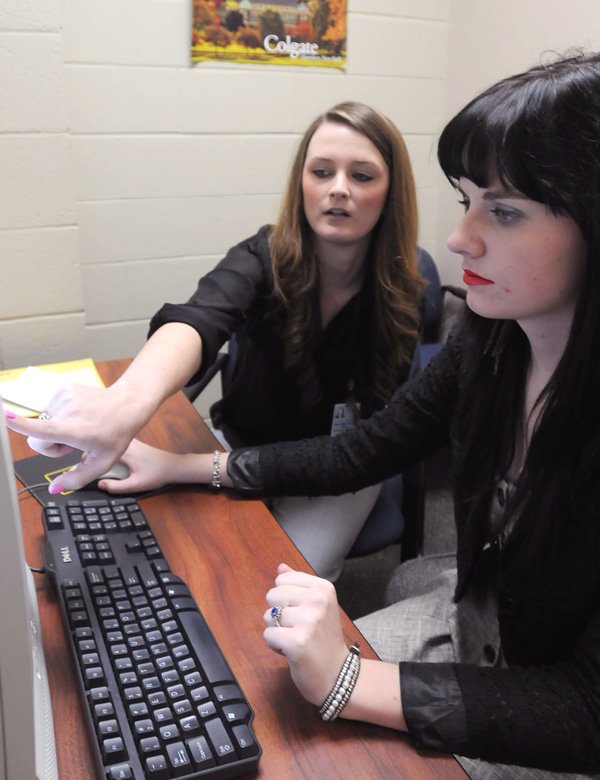SPRINGDALE — Leslie Silva, a senior at Har-Ber High School, found encouragement to pursue her dream of attending college, despite challenges that come with being a teen mother and the first in her family to aspire to college.
“I always told myself that I was going to go to college,” she said.
The 17-year-old was accepted into a new program that provides a mentor to walk her through each step of going to college to become a nurse. Silva meets with her Razor COACH mentor every Thursday at the counseling office at Har-Ber.
Creating Opportunities for Arkansans’ Career Hopes began in the fall as a project of the University of Arkansas College of Education and Health Professions, the Northwest Arkansas Council and the Walton Family Foundation. The program placed 15 career coaches in 16 high schools this school year in Benton and Washington counties.
The goal is to raise graduation rates and college admission rates to augment the work force in Northwest Arkansas, said Josh Raney, the program director.
The program differs at each school, with some targeting only seniors and others including sophomores and juniors, Raney said. The campuses invited students to apply for the program, and about 360 students across Northwest Arkansas were selected at random to participate. Those selected include first-generation college students, youths who wanted guidance in planning for after high school, and who struggle with grades or attendance, Raney said.
The coaches are graduate students in the counseling education program at UA and receive stipends and tuition waivers, he said.
Coaches tailor their help to each student. Assistance can include preparing for the ACT, helping with time management or study skills,completing college applications and applying for financial aid, he said.
FINDING HELP
At Har-Ber, two coaches have assisted 37 students in setting academic goals to improve grades, develop better study habits or improve time management, according to a progress report Raney compiled for the fall semester. Thirty-four of the students have taken the ACT. Twenty five applied to at least one college or technical school, and one received an academic scholarship.
Silva’s mentor, Rhiannon McKee, led her to a list of scholarships for Hispanic students, to the fastweb.com, a website for scholarships and financial aid, and to a book at the counseling office that contains information about local scholarships.
“It’s better if I can talk to one person and get my questions answered,” Silva said. “I didn’t know where to look for scholarships.”
Students at Har-Ber are motivated to overcome obstacles, including busy schedules, transportation issues and concerns about the ability to pay for college, the report states.
McKee said she too was a first-generation college student. She graduated from Southside High School in Fort Smith in 2006 and went to the University of Arkansas at Fort Smith, where she earned a bachelor’s degree in psychology.
Her parents expected her to go to college and helped her research the options, she said.
“I’ve been working and paying my way through this entire time,” said McKee, who began working at age 16. “It’s not impossible just because their parents didn’t go to school.”
As a coach, she works to take some of the confusion out of the process for her students, she said. They have an ultimate goal in mind.
“These are the steps to get to that goal,” she said. “They don’t know what thefirst step is.”
The weekly coaching sessions with each student typically last 35-40 minutes, McKee said. The students are at different points in the process. Some are struggling to pass their classes and are working hard to graduate high school. Others have started exploring careers and colleges, but want to make sure they haven’t overlooked a scholarship opportunity.
FOLLOWS STATE MODEL The program follows the model of Gov. Mike Beebe’s Arkansas Works, which began in January 2010 and covers 21 counties.
Those counties did not include UA’s home Washington County, or Benton County. The closest county included was Newton.
Arkansas Works targeted counties with high numbersof low-income people and unemployed people, and low percentages of adults who have bachelor’s degrees.
The Walton Family Foundation provided a $1.5 million three-year grant for UA and the council to launch the Razor COACH program.
Silva’s goal is to become a registered nurse. She knew where she wanted to go to college, but she was confused about the process of applying for financial aid and scholarships.
McKee has worked to build Silva’s confidence. Silva was worried about finding scholarships because, despite finishing the fall semester with straight As, her overall grade-point average is a 2.5. Many scholarships won’t accept grade-point averages below 3.0.
“There’s not many that can say they have straights As,” McKee told her. “You are still going to get financial aid. You are going to get scholarships.”
Silva doesn’t want to burden her parents with the cost of college, she said.
She plans to spend her first two years in the medical program at Northwest Arkansas Community College in Bentonville and then transfer to UA at Fayetteville to finish. She hopes to work for a year or so and then return to school for two more years for specialized training.
Silva changed her focus during her junior year with the November 2011 birth of her son.
“I stopped missing school unless it was for him,” she said. “My grades, I’m more focused. I don’t talk to people as much in class as I used to. It’s changed a lot.”
Nationwide, about 50 percent of teen mothers receive high school diplomas by age 22, compared with 90 percent of women who had not given birth during adolescence, according to the Centers for Disease Control and Prevention.
At night, Silva waits until her son is asleep to start her homework. “I think I need to go for a career,” she said. “I’ve been planning my future a lot.”
Northwest Arkansas, Pages 7 on 01/28/2013

